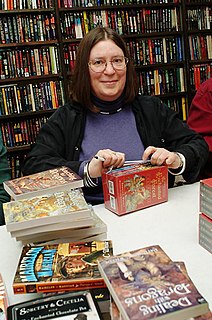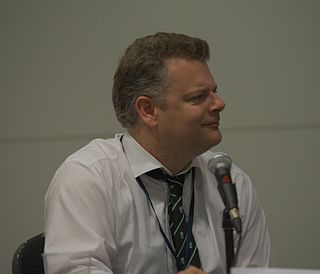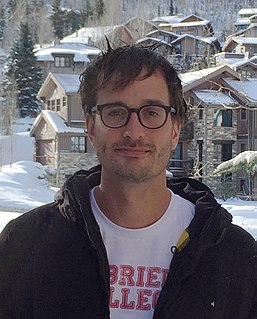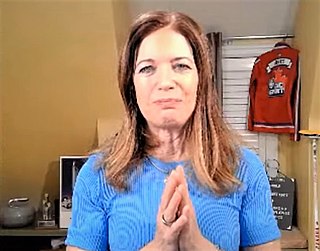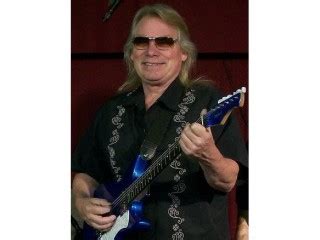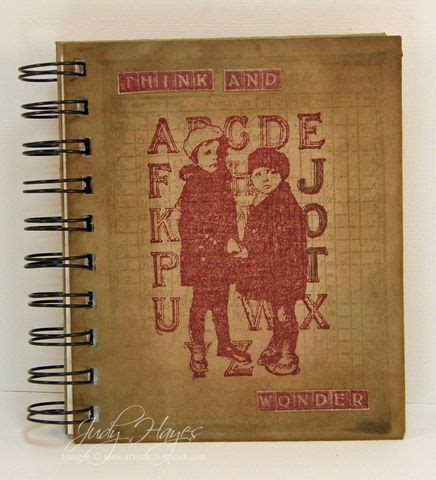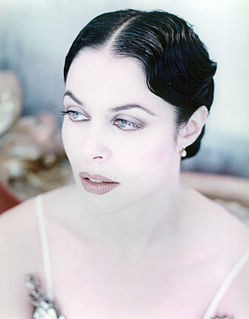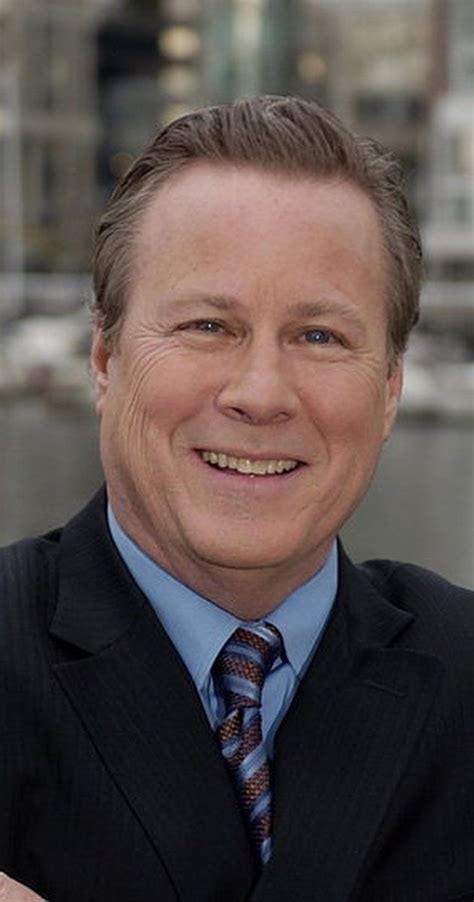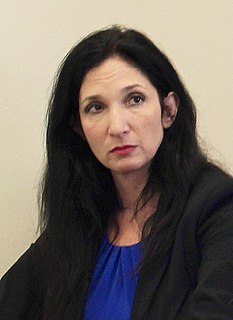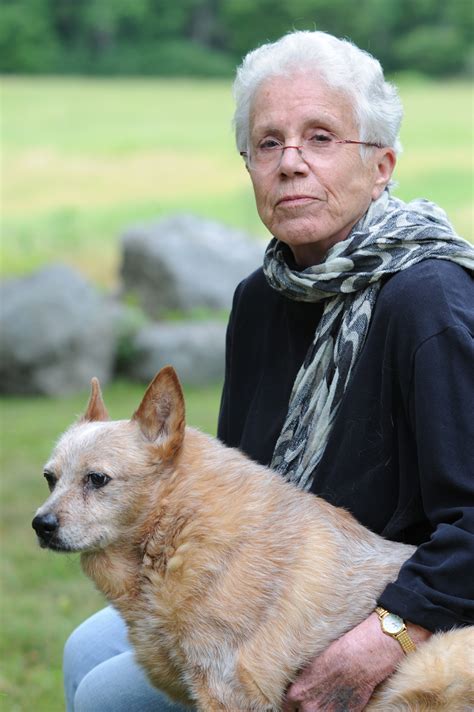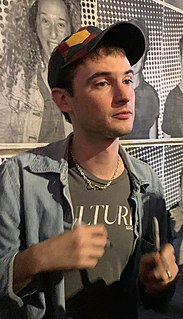Top 1136 Richard Feynman Quotes & Sayings - Page 19
Explore popular Richard Feynman quotes.
Last updated on April 15, 2025.
I knew Richard E. Grant, and I went to him and said "Would you like to [play Kafka in the film]?" and he said yeah, and then suddenly I had all these people who were happy to come along. We got a little bit of money from Scottish Screen to pay for it. I got so many favors because I knew people in the business. I was in a remarkably good position. I got so many favors from people. I got the Monty Python technical people.
I get questions from Richard Sandomir at the New York Times or Michael Hiestand at USA Today about issues .., 'well, there's a blog site that says you root too hard for the Red Sox. Or people don't like you because you're rooting against their team ...'I don't want to say it's bad. There are certainly things you learn from the internet. You certainly learn from people's opinions. I think you're going to get some of the negative a lot more than the positive, but I think you can learn from it.
I wrote a letter to the magazine [Time magazine] pointing out that [Richard] Corliss's comparison of Christopher Lee's Saruman to Osama Bin Laden, and the vastly outnumbered defenders of Helm's Deep united against the Orcs to the "Coalition of the Willing" fighting the good fight against Muslim hordes, displayed the simplistic, xenophobic, and arrogant worldview that makes the government of the United States feared and mistrusted around the world. The editors claimed they had no space to print my brief letter, which I felt was dishonest and cowardly.
Target prices? How that works? I know quite a bit about farm policy. I come from Indiana, which is a farm state. Deficiency payments - which are the key - that is what gets money into the farmer's hands. We got loan, uh, rates, we got target, uh, prices, uh, I have worked very closely with my senior colleague, (Indiana Sen.) Richard Lugar, making sure that the farmers of Indiana are taken care of.
I turn around from the window and for the first time I see him... It is Richard, smiling at my surprise. I run to him, without thinking what I am doing. I run to the first friendly face that I have seen since Christmas, and in a moment I am in his arms and he is holding me tightly and kissing my face, my closed eyes, my smiling mouth, kissing me till I am breathless and have to pull away from him.
She had forgotten them all; forgotten Richard down in the mud, and the marquis and his foolish crossbow, and the world. She was delighted and transported, in a perfect place, the world she lived for. Her world contained two things: Hunter, and the Beast. The Beast knew that too. It was the perfect match, the hunter and the hunted. And who was who, and which was which, only time would reveal; time and the dance.
You mean I'm going to have to do a spell in front of a bunch of toffs?" Kim said, outraged that no one had mentioned this before she had agreed to this come-out. "Yes, exactly", Lady Wendall said serenely. "You and Richard have plenty of time to design something that will reflect your unique background, as well as demonstrating your abilities as a wizard. I am looking forward to seeing what you decide upon." "I could pick everyone's pockets at once with magic, "Kim said, still disgruntled. "That'd 'reflect my unique background', all right".
In 1867, George Campbell, Duke of Argyll, had published The Reign of Law, a book that Darwin found deeply annoying. A supporter of Richard Owen, Campbell argued that while evolution (or Development) might be observable in the fossil record, it was merely evidence of God's purpose. God, for example, would cause horses and oxen to evolve in time to meet human needs. The brightly colored plumage of birds, Campbell went on, were simply God's decorations of nature for humanity's enjoyment.
Richard [Griffiths] was by my side during two of the most important moments of my career. In August 2000, before official production had even begun on Potter, we filmed a shot outside the Dursleys', which was my first ever shot as Harry. I was nervous and he made me feel at ease. Seven years later, we embarked on 'Equus' together. It was my first time doing a play but, terrified as I was, his encouragement, tutelage and humor made it a joy. In fact, any room he walked into was made twice as funny and twice as clever just by his presence.
Once committed to fight, cut. Everything else is secondary. Cut. That is your duty, your purpose, your hunger. There is no rule more important, no commitment that overrides that one. Cut. Cut from the void, not from bewilderment. Cut the enemy as quickly and directly as possible. Cut decisively, resolutely. Cut into the enemy’s strength. Flow through the gaps in his guard. Cut him. Cut him down utterly. Don’t allow him a breath. Crush him. Cut him without mercy to the depths of his spirit." -Richard Rahl
I love you," she whispered. Richard pulled her tight against him. His fingers traced a trail down the bumps of her spine. "I feel so frustrated that there aren't any better words than "I love you,"" he said. "It doesn't seem enough for the way I feel about you. I'm sorry there aren't any better words to tell you." "They are words enough for me." "Then, I love you, Kahlan. A thousand times, a million times, I love you. Forever.
I enjoyed being at Jurassic Park, with Jeff Goldblum and Sir Richard Attenborough. It's funny, because Steven Spielberg would actually operate the camera sometimes. He'd consider the camera, and he'd be kind of looking at me. He actually shot a few of the things that I'm in, in that lab, with that long ash dangling off that cigarette. Hogging that fake cigarette. Because I had quit smoking, and he wanted to make sure I didn't go back, so he got me the worst-tasting fake cigarettes ever.
I was tied down in that chair for 10 minutes and experienced what it was like to be completely powerless while someone else has complete dominance. It's sadistic, even though I find Richard to be a really lovely human being. That's what the whole film "Tickled" is about. It's not a film about tickling, but I think tickling offers a really good visual metaphor for the much bigger ideas that we were trying to get at about power and control - by people who have a lot of money - over people without money and who have no power in the relationship.
My curling personality really had the killer instinct, compared to the real me. I kind of liken it to when a surgeon is going into the operating room and has to put his game face on. But in real life, he might be a charming guy to have a beer with. Everybody always told me that I had Maurice Richard eyes when I competed; that the intensity that was on my face was scary. But that was what I needed to bring when I stepped on the ice. And even to this day, when I get on the rink, that person comes out pretty quickly. My brain and body know that I'm going into battle.
Richard wrote a mental diary in his head. Dear Diary, he began. On Friday I had a job, a fiance, a home, and a life that made sense. (Well, as much as an life makes sense). Then I found an injured girl bleeding on the pavement and I tried to be Good Samaritan. Now I've got no fiance, no home, no job, and I'm walking around a couple of hundred feet under the streets of London with the projected life expectancy of a suicidal fruit fly.
I do believe that the Barack Obama administration has reached a new low by using the instruments of the state against its political adversaries. Obama does not see people who disagree with him as well-meaning opponents but rather as enemies. That's not something that Jimmy Carter or Bill Clinton did as President. Probably Obama's direct descendant in this line is Richard Nixon. And Obama seems to have carried Nixonian tactics to a new low. So, we've turned a corner in American politics that doesn't bode well for our future.
John F. Kennedy, who seized the White House from Richard Nixon in a frenzied campaign that turned a whole generation of young Americans into political junkies, got shot in the head for his efforts, murdered in Dallas by some hapless geek named Oswald who worked for either Castro, the mob, Jimmy Hoffa, the CIA, his dominatrix landlady or the odious, degenerate FBI chief J. Edgar Hoover. The list is long and crazy - maybe Marilyn Monroe's first husband fired those shots from the grassy knoll. Who knows?
Modern presidential debating only started with Richard Nixon and John F.Kennedy in 1960, although the proximity of that to the Lincoln-Douglas centennial is more than accidental. The reason is, I think, the medium. Abraham Lincoln and Stephen A. Douglas were talking, but the talking was in terms of logic, development, and reasoning. Television, as a medium, resists those qualities in speaking - it favors quick cuts, one-liners, and talking points. I think the modern debates are largely the prisoners of the televised medium
I just would like to say that over more than a quarter-century as a scientist and a believer, I find absolutely nothing in conflict between agreeing with Richard [Dawkins] in practically all of his conclusions about the natural world, and also saying that I am still able to accept and embrace the possibility that there are answers that science isn't able to provide about the natural world - the questions about why instead of the questions about how. I'm interested in the whys.
Nobody's good. I hate it. I truly hate it. I mean, there's a lot of guys doing stuff I admire, but stand-up-wise I feel very alone. I really miss Bill Hicks. I wish I could have put him on my show. And I really miss Sam Kinison a lot. Richard Pryor's sick... It's like you get here and then, oh wait a minute, there's nobody here any more. I feel like the guy who finally got into Studio 54, three years too late, Duh, where are all the famous people?
Friends of Bernard's [Leach] came to visit, and when we went to London, we were given introductions to people like Lucie Rie, Hans Coper, Richard Batram. All these people were, let's say, made available to us by a friendship with Leach. In addition there was a potter's group - what was it called? I think it was called the Cornish Potters Society, but I'm not sure of that. Anyway, they had meetings and we would go with Leach to these meetings and meet other potters, and they would have programs where they would discuss pottery and people would interchange ideas.
Auroville (City of Dawn) is an 'experimental' township in Viluppuram district in the state of Tamil Nadu, India near Puducherry in South India. It was founded in 1968 by Mirra Richard (since her definitive settling in India called '[The] Mother') and designed by architect Roger Anger. Auroville is meant to be a universal town where men and women of all countries are able to live in peace and progressive harmony, above all creeds, all politics and all nationalities. The purpose of Auroville is to realize human unity.
It's funny what [producer Richard Zanuck said about even though you can't quite place when the book or the story came into your life, and I do vaguely remember roughly five years old reading versions of Alice in Wonderland, but the thing is the characters. You always know the characters. Everyone knows the characters and they're very well-defined characters, which I always thought was fascinating. Most people who haven't read the book definitely know the characters and reference them.
There are, occasionally, writers who are able to combine both story and style. They are, of course, the best. You get a spectacular view and you also get to look at it from the backseat of a chauffeur-driven Cadillac. In the field of fantasy, those writers able to combine story-as-narration with story-as-style are even rarer. But there are a few...the late Theodore Sturgeon, the early Ray Bradbury...and Richard Christian Matheson. A brilliant chip off the old block.
And what of my extended family-birds, beasts, and reptiles? They too have drowned. Every single thing I value in life has been destroyed. And I am allowed no explanation? I am to suffer hell without any account from heaven? In that case, what is the purpose of reason, Richard Parker? Is it no more than to shine at practicalities-the getting of food, clothing and shelter? Why can't reason give greater answers? Why can we throw a question further than we can pull in an answer? Why such a vast net if there's so little fish to catch? (pg. 98)
My name is Mary Katherine Blackwood. I am eighteen years old, and I live with my sister Constance. I have often thought that with any luck at all, I could have been born a werewolf, because the two middle fingers on both my hands are the same length, but I have had to be content with what I had. I dislike washing myself, and dogs, and noise. I like my sister Constance, and Richard Plantagenet, and Amanita phalloides, the death-cup mushroom. Everyone else in our family is dead.
The earliest stand-up comedy I was aware of was Bill Cosby. I watched Saturday Night Live as soon as I was aware of it, and Monty Python used to be on PBS at weird hours, so I used to try to watch that. And I loved George Carlin on SNL, that was the first stand-up I ever really remember seeing on TV. And then Steve Martin. I guess I was in fifth or sixth grade when Steve Martin showed up, and he was instantly my idol. And Richard Pryor around the same time too, I sort of became aware of him, though I don't remember the first time I saw him.
Before I even knew what stand up was, I tried to make people laugh at school because that was how I made friends, so I think that's how I got drawn into comedy and obviously I was just some kid at school being silly, so the first time I saw a professional comedian and how smooth and funny the person was I totally got into standup and I would say obviously Richard Pryor was the guy. He's the greatest of all time and then George Carlin, Sam Kinison, Bill Cosby. It's so weird to bring up his name now but leaving out his off-stage antics... you could learn a lot from him.
Richard Dawkins says he can't be sure God doesn't exist. Well, you know what I do when I'm not sure about something? I go on a big crusade about it and write a bunch of books on the subject. No, wait, that sounds more like what someone with a mental disorder would do. That's one of the crazy things about lots of atheists: They're whole movement is supposed to be about being logical and reasonable, yet they tend to rail against religion is a very mindless way that doesn't seem to serve any more purpose than a tantrum. Perhaps I just don't understand their strong faith in not having faith.
Richard Branson is probably the most visible of the private commercial space guys, and what is venture, Virgin Galactic is about is sub orbital flight. That is, you'll see a spacecraft that looks more or less like an airplane and it will fly into space, but only spend about 15 minutes. It'll go up in a parabolic arc and then fall back down, and so the customers on that flight will only get about five minutes of weightlessness. They'll get to glimpse the horizon of the Earth, take a look at it before just before they start coming back down into the atmosphere.
I was deeply moved by Richard Blanco's reading of his inaugural poem-a timely and elegant tribute to the great diversity of American experience. And now comes this fine meditation on his experience of coming to poetry, of making the poem and the months surrounding its making-a testament to the strength and significance of poetry in American culture, something not always seen or easily measured. Today Is For All of Us, One Today is a necessary intervention into the ongoing conversation about the role of poetry in public life.
His face set in grim determination, Richard slogged ahead, his fingers reaching up to touch the tooth under his shirt. Loneliness, deeper than he had never known, sagged his shoulders. All his friends were lost to him. He knew now that his life was not his own. It belonged to his duty, to his task. He was the Seeker. Nothing more. Nothing less. Not his own man, but a pawn to be used by others. A tool, same as his sword, to help others, that they might have the life he had only glimpsed for a twinkling. He was no different from the dark things in the boundary. A bringer of death.
When my band MU landed on Maui in 1973 we were greeted by a wonderful group of peace loving brothers & sisters who we immediately formed a bond with. We had two instant roadies, Spider & Richard, who helped with every move of our musical equipment. We settled into our house on the edge of the rainforest that eventually became a portable studio. We started rehearsing and booked the Lahaina Civic Auditorium for a full moon concert starring MU and a local band The Space Patrol.
Imagine you're a forty-year-old, Richard," Hamilton said to me around this time, while working as a salesman at a Radio Shack in Lynn Valley,"and suddenly somebody comes up to you saying, 'Hi, I'd like you to meet Kevin. Kevin is eighteen and will be making all of your career decisions for you.' I'd be flipped out. Wouldn't you? But that's what life is all about - some eighteen-year-old kid making your big decisions for you that stick for a lifetime." He shuddered.
It wouldn't matter if every single President since Washington had been a Bible-toting, evangelical Christian. They weren't, of course, but even if they had been, it still would not change the secular foundation of our republic. Christians like to quote various Presidents or Supreme Court Justices who (quite incorrectly) have referred to our "Christian nation." But what do those quotes prove? I could quote Richard Nixon, but would that prove that ours was intended to be a nation of crooks?
Elizabeth Taylor is, in my opinion, the greatest actress in film history. She instinctively understands the camera and its nonverbal intimacies. Opening her violet eyes, she takes us into the liquid realm of emotion, which she inhabits by Pisces intuition. Richard Burton said that Taylor showed him how to act for the camera. Economy and understatement are essential. At her best, Elizabeth Taylor simply is. An electric, erotic charge vibrates the space between her face and the lens. It is an extra-sensory, pagan phenomenon.
The writer must always leave room for the characters to grow and change. If you move your characters from plot point to plot point, like painting by the numbers, they often remain stick figures. They will never take on a life of their own. The most exciting thing is when you find a character doing something surprising or unplanned. Like a character saying to me: ‘Hey, Richard, you may think I work for you, but I don’t. I’m my own person.’
The only sovereign I can allow to rule me is reason. The first law of reason is this: what exists exists; what is is. From this irreducible, bedrock principle, all knowledge is built. This is the foundation from which life is embraced. Reason is a choice. Wishes and whims are not facts, nor are they a means to discovering them. Reason is our only way of grasping reality–it is our basic tool of survival. We are free to evade the effort of thinking, to reject reason, but we are not free to avoid the penalty of the abyss we refuse to see." -Richard
I think there's no question that, even though we may not have the evidence as Richard (Perle) says, that there have been such contacts (between Iraq and al Qaeda). It' s normal. It's natural. These are a lot of bad actors in the same region together. They are going to bump into each other. They are going to exchange information. They're going to feel each other out and see whether there are opportunities to cooperate. That's inevitable in this region, and I think it's clear that regardless of whether or not such evidence is produced of these connections that Saddam Hussein is a threat.
This grandson of an Irish immigrant, after whom I was named, Richard Michael Cawley is my grandfather. I was right that - and I always tell kids that, you know, if my small life represents anything is that if you work hard, you study hard, and you never give up on your dreams and listen to people that care about, you can live those dreams. And for me to be up on the platform standing with my right hand in the air in the presence of my family and our new president [Donald Trump], it just tells me this is a great country. My grandfather was right.
Ronald Reagan, and before him, Richard Nixon, and before Nixon, a slew of conservative politicians going back through American history, have played to the idea that the great majority of poor people are somehow "undeserving," and being undeserving, merit at best very limited, oftentimes deeply coercive and humiliating, government interventions to better their finances. That narrative isn't about to disappear overnight; but it strikes me as being like a weak gruel - there's no sustenance in it, no heft behind the argument.
I remember going to him (Richard England) and saying, “You know, how come you don't give me any parts?” I did Raymonda and a couple of other nice parts, but mostly he was giving a lot of parts to the other girls. He said, “Those girls are short and they're not going to get into ABT, but I think you are going to get into ABT. I think you're going dance later, so I'm not worried about you.”
As many critics of religion have pointed out, the notion of a creator poses an immediate problem of an infinite regress. If God created the universe, what created God? To say that God, by definition, is uncreated simply begs the question. Any being capable of creating a complex world promises to be very complex himself. As the biologist Richard Dawkins has observed repeatedly, the only natural process we know of that could produce a being capable of designing things is evolution.
Richard Donner made great movies. Seminal movies. The Academy, though, and we have to be careful here, should recognize popular films. Popular films are what make it all work. There was a time when popular movies were commercial movies, and they were good movies, and they had to be good movies. There was no segregation between good independent films and popular movies.
I did a film about child abuse with the great producer-director Richard Donner, Radio Flyer. Again, I was replacing somebody, but Lorraine Bracco was in it, and they wanted me as the cop in the thing to fall in love with Lorraine, but I said I wouldn't. I mean, I'm a cop, and she's ignoring that her kids are being beaten up by their stepfather. And we had an argument... well, not an argument, but a discussion about it. I said, "I just don't feel right. It's like you're taking everything away from the reality of the movie. Aren't you kind of idealizing this a little bit?
Harry is heavily into camping, and every year in the late fall, he makes us all go to Assateague, which is an island on the Atlantic Ocean famous for its wild horses. I realize that the concept of wild horses probably stirs romantic notions in many of you, but this is because you have never met any wild horses in person. In person, they are like enormous hooved rats. They amble up to your camp site, and their attitude is: We're wild horses. We're going to eat your food, knock down your tent and poop on your shoes. We're protected by federal law, just like Richard Nixon.
I just trust the people involved. Marvel and DC for the last 16 years - is that 90 percent of the time it's incredible top talent. Like, this is what makes it different from the pre-2000 superhero movies. I would say, except Tim Burton and Richard Donner, it was generally, comic book movies were done by guys who weren't that into the material and people who didn't really respect the stuff. But as everything, whether it's Wolverine, X-Men, Avengers, Batman, all these things, it's just been done by top-tier people. I have total confidence that they'll continue that tradition of being great.
I can't predict if I will see a woman president, but I think I may well because, again, Hillary Clinton got more votes probably than any other Democratic candidate ever, except for Obama. But she got more votes than Trump and she got more votes than Richard Nixon got when he won the election, more votes than John Kennedy got when he won.
Imagine a country where the majority of the population reaps the majority of the benefits for their hard work, creative ingenuity, and collaborative efforts. Imagine a country where corporate losses arent socialized, while gains are captured by an exclusive minority. Imagine a country run as a democracy, from the bottom up, not a plutocracy from the top down. Richard Wolff not only imagines it, but in his compelling, captivating and stunningly reasoned new book, Democracy at Work, he details how we get there from here - and why we absolutely must.
There were really funny characteristics about this guy [Richard Nixon], chief of which would be that he seemed to devote about 85 percent of his waking energy to suppressing any sign of his emotional response to anything that was going on around him, and the other 15 percent blurting out those authentic responses in the silliest and most inopportune ways. And he had these smiles that would come at the most inappropriate times - just flashes that there was an inner life screaming to get out.
To write a book such as Tiger Bone & Rhino Horn is a formidable undertaking. You must accumulate thousands of facts and spare no detail, no matter how terrible. It is always easier to write a piece of fluff and leave everybody smiling. But then, the horrors of poaching would continue unchallenged?like as tent caterpillars consuming an apple orchard, our species mindlessly consumes the others of the earth. At present, the most significant hope for our planet may be knowledge, and Richard Ellis has done a heroic job in providing a large measure of that.
The question is: exactly how did life get here? Was it by natural selection and random mutation or was it by something else? Everybody - even Richard Dawkins - sees design in biology. You see this design when you see co-ordinated parts coming together to perform a function - like in a hand. And so it's the appearance of design that everybody's trying to explain. So that if Darwin's theory doesn't explain it we're left with no other explanation than maybe it really was designed. That's essentially the design argument.
The thing that is always so surprising about plays written in another century is how remarkably elastic they are. When you listen to the way in which Shakespeare attacks relationships, for example, even though the words may start off sounding foreign, in actuality they are so accessible, the motivations so clear, the resonances so contemporary. When you put it in a modern context - we could well be in a place with someone like Gaddafi or Mubarak - it becomes apparent how Richard III resonates with that type of personality, with media and manipulation, alliances and petty jealousies.
You know that scene at the beginning (of 'Pirate Radio') where I take The Count a cup of tea in the studio, and he shakes my hand, gives me a hug, and slaps me on the arse? That's genuinely the first time Tom Sturridge met Philip Seymour Hoffman. Literally, I'd hadn't seen him or exchanged words with him before. Richard just called me on set and said, 'Take him a cup of tea.' So that's what I did. And the smile of delight as he slaps me on the arse is purely mine.
It's Richard Kelly's brilliance, because he led me to Donnie Darko performance. He wanted sincerity, he didn't want it to be one color, and he made me go vulnerable, and I think that's why it works. When you can get all those different colors and levels in one line. Time Out New York voted it "Best Line Of The Year" - which is crazy, because how many words is it? "Sometimes. I. Doubt. Your. Commitment. To. Sparkle. Motion." Eight words. It's crazy.
From Richard Holbrooke - and I miss him every day - I learned two things. One, prioritization: Never take your eye off the longer-term reforms. The other thing is, he was a hell of a schmoozer! So I should take advantage of my Irish love of beer and gift of the gab, and build relationships. That's a cherished part of the job, asking someone, "How did you get to be the Rwandan ambassador?" I try to take advantage of the fact that I hope to be here at least until the president's term ends getting to know my colleagues.






